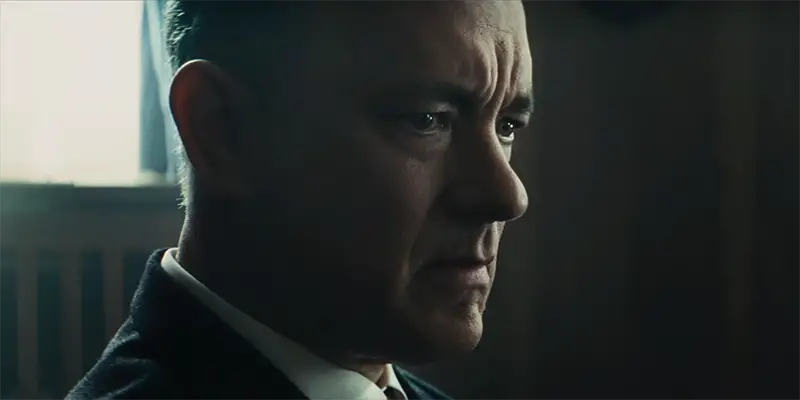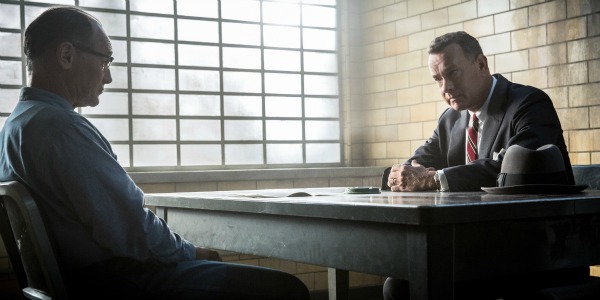BRIDGE OF SPIES: Steven Spielberg’s Dreary Tale of Optimism

Jay is just a dude who takes in an unhealthy…
Bridge of Spies is not what I would call a happy film. Gray snow envelopes the dilapidated East German cityscape and we find Tom Hanks‘s character interacting with others primarily in poorly lit, often dank rooms. Nearly all of the characters are entirely self-interested with blinders positioned perfectly to block out the undesired effects their actions can have on others.
It is clear that the motivations for good things happening are not always for the sake of having good things happening. At the end of the day, it’s all politics; and politics suck. So, in spite of all this, why did I leave the theater with a fat grin on my face and warm fuzzies in my stomach?
Back in the USSR
There is nothing revolutionary about Bridge of Spies. You will not leave the theater with your breath taken away or seeing the world through a new lens, but you will experience two-and-a-half hours of very, very good cinema. The script is not the strength of the film – Spielberg just directs the hell out of it. It doesn’t hurt that just about every scene in the film features Tom Hanks, either. It is not an Oscar-friendly role, and it will probably be lost on Hanks’ resume, but there are very few beings on this planet that can carry this much acting weight. Just like Spielberg’s direction, Hanks is subdued in a way that most big-name actors would not enjoy.

The film revolves around Tom Hanks’ lawyer-to-CIA-negotiator James Donovan who, in 1957, is asked to represent suspected Soviet spy Rudolph Abel (Mark Rylance) in American court. It is a lose-lose proposition any way you slice it, but Donovan is a man of principle and believes that every man deserves a fair shake in court. He dives headfirst into the case, much to the dismay of the American public. In their eyes, he is a traitor by association who should have thrown Abel to the wolves. In the end, Abel is found guilty but spared from the electric chair.
Donovan believes that chapter of his life to be over. But the Soviet capture of an American pilot sucks him right back into the heart of the Cold War. Donovan is sent to East Germany to negotiate a prisoner swap. His singular mission is to bring the pilot back stateside, but he is determined to bring another man, an American economics student studying in Germany, back home, as well.
From then on it is Hanks just wheelin’ and dealin’ with some guys who are not fans of either. Those East Germans sure were stubborn. You root harder and harder for Donovan as he continues to hit snags with the foreign governments, as well as his own. He defies the orders of the CIA, whose only objective is to retrieve the captured pilot, completely disregarding the young student. Donovan’s determination and perseverance could be corny in the hands of another director, but Spielberg is able to navigate the choppy waters of this kind of storytelling masterfully.
Never Count Out The Spielberg
The Spielberg Effect is very present in Bridge of Spies, but this is a calmer, more understated Spielberg. His eternal optimism, which can sometimes feel a bit tired and hokey, works here because he does not shy away from the bleakness surrounding the situation. There are very few moments of positivity for Donovan. It isn’t a complete downer, but it probably isn’t one to see on a first date. There is a pervasive sense of dreariness and unfairness that even Donovan recognizes. This is the rare American man who views Soviets not just as the enemy, but as humans.
Due process is due to all, not just those who are on your side. Throughout the film, Hanks is often backlit, standing in a poorly lit room behind a window, a sign of morality in an era often devoid of it. Meanwhile, the shady characters Donovan deals with are often lit from the side, with half of their faces shrouded in darkness, their ideals always in question. As you would expect, Spielberg uses a fine comb to smooth out the details of Bridge of Spies.

When all is said and done, though, Spielberg reminds us that some things are worth fighting for, no matter how painstaking the process can be. The film does a good job of making the final swap not a strictly black-and-white affair. It is not a heroic American hero for a Soviet villain. The American pilot is very flawed in his own way, and the Soviet, Abel, is a richly developed character straddling the line that lies between someone you should love and someone you should revile. There is life in these characters that extends beyond what you see on-screen. We are left to wonder what good or bad things they have done in their lives to get to this point. No one is perfect, but no one is all bad, either.
Meeting of the Minds
Yesterday, I recorded a Film Inquiry podcast and the conversation moved to Spielberg. Alex Lines asked, “When did Spielberg films stop being events?” This is something that I had not, expressly, contemplated before. The exact time can be debated (After Jurassic Park? Saving Private Ryan?), but it got me thinking about how Spielberg’s sensibilities have changed over the years.
He is no longer the go-to director for a $150 million blockbuster, but he is still one of the most adept filmmakers on Earth. I have no doubt that, if he wanted, he could pull a $150 million budget out of thin air, but that is just not his mindset anymore. I imagine War of the Worlds and Indiana Jones and the Kingdom of the Crystal Skull will do that to a man. There is still a sense of wonder, but it is the human spirit that moves him these days, not breathtaking dinosaurs or dashing adventurers.
It’s impossible to know exactly how much work the Coen Brothers did on this film’s script (they were brought in late to edit Matt Charman’s original script), but you can certainly feel the classic Coen beats being handled in a Spielbergian way. As in many Coen films, there are phrases that make appearances multiple times in the script. With each occurrence, these phrases wedge themselves further and further into the film’s overarching theme.
In Bridge of Spies, we see 3 or 4 examples of a very Coen-y exchange where Donovan asks Abel why he isn’t nervous, to which Abel replies, “Would it help?” (Idea for the title of a Coen Bros. biography: What’s the Point?) Spielberg does a fantastic job of bridging the gap between the Coens’ cynicism and his own sense of hope and wonder. In the Coens’ heads, this quote may have meant that his doom was eminent, but Spielberg presents it as a sense of calm, instead of a sign of a nihilistic worldview.

Really, the film is very much akin to Spielberg’s last film, 2012’s Lincoln. The themes in both are of one man being able to rise above the frustrating games that politicians and diplomats must play to bring about positive change in the world. Lincoln is a fantastic character study of a truly special man, but it is singular in that sense. In Bridge of Spies, he wants to let us know that any of us can accelerate progress.
Spielberg is far more universal, here. Yes, there will be hoops to jump through and the occasional butt to kiss, but if you are willing to swallow your pride and put your all into positive change, there is hope. It sounds hokey and amateurish, but Spielberg manages to Spielberg his way into your heart and leave you forgetting all of that and wanting to go forge your own path to positivity.
All-In-All
Bridge of Spies is not a trend-setting film, or even a particularly memorable one, but Steven Spielberg is able to bring his flair for positivity into a bleak Cold War story and create a high caliber cinematic experience. Tom Hanks does a great job carrying the brunt of the film in a tough but ultimately rather thankless role; a testament to his love for Spielberg and his humility as an actor. Devoid of spectacle but still full of wonder, Bridge of Spies is well worth a watch, even if you may be the youngest one in the theater (just like I was).
What did you think of Bridge of Spies? Does Spielberg still have “it”? Let us know in the comments!
Bridge of Spies is currently showing in cinemas around the U.S., and will get its British release on November 27, 2015. For international release dates, check here.
(top image source: Walt Disney Studios Motion Pictures)
Does content like this matter to you?
Become a Member and support film journalism. Unlock access to all of Film Inquiry`s great articles. Join a community of like-minded readers who are passionate about cinema - get access to our private members Network, give back to independent filmmakers, and more.
Jay is just a dude who takes in an unhealthy amount of media of all types. Currently living in Atlanta, Georgia, he firmly believes that all movie theaters should have leather recliners, you eat popcorn too loudly, and if you don't put that cellphone away in 2 seconds you will learn the definition of frontier justice.













